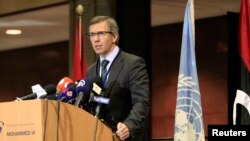United Nations mediators led a second day of peace talks between Libya's rival governments Friday in Morocco, with parties to the talks expressing confidence in the progress.
"I am optimistic about the security arrangements, which is a key element," the U.N. envoy to Libya, Bernardino Leon, was quoted as saying Friday in a post on the U.N. mission's Twitter page. "The new government needs a secure environment to work."
The U.N. envoy told reporters Thursday that "it is possible to make a deal," which he said was "very important because in the last months, this was not the case."
Leon met separately with representatives of the internationally-recognized Libyan government and the Islamic extremists who have taken over the capital, Tripoli, and set up their own separate administration.
The two governments did not meet face-to-face in three previous rounds of talks either, but U.N. officials hope to get them talking to each other.
The Al Jazeera news agency reported Friday that the two sides were moving closer to a deal on a national unity government, quoting an official from the Tripoli-based government as saying a draft will be submitted to the U.N. "as soon as possible."
The European Union's foreign policy chief said the EU stands ready to provide support "with all possible means" if a political settlement goes forward.
"We have started discussing possible European Union contributions," Federica Mogherini told a news conference in the Latvian capital, Riga, Friday, after talks with EU foreign ministers.
That would include "all possible forms of support," including "missions or operations," she said.
Libya has been increasingly unstable since longtime dictator Moammar Gadhafi was overthrown and killed in 2011. Fighting escalated in August when the elected government and parliament were forced to relocate outside Tripoli.
The country's lucrative oil facilities have been at the center of battles between the two sides.
On Friday, gunmen attacked the al-Ghani oil field, killing eight guards.
Earlier this week, Libya's state-run oil company stopped production at 11 oil fields due to the security problems.





